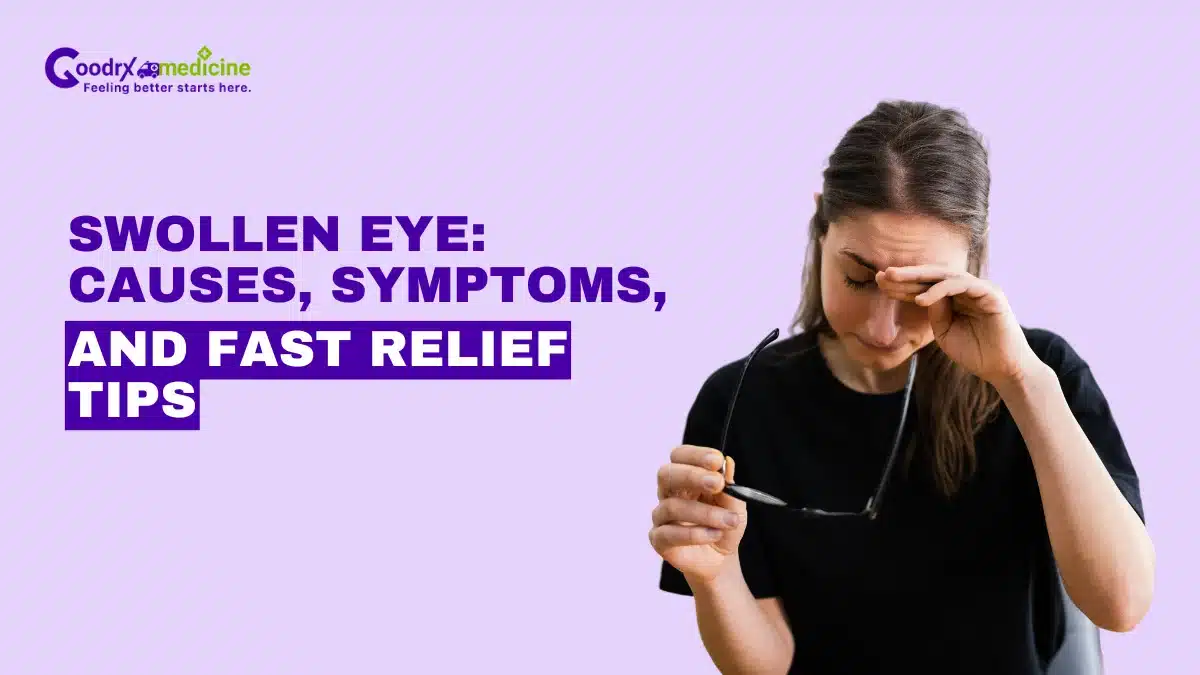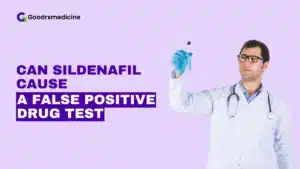Woke up with one eye swollen and puffy? Swollen eyes are common and often not serious. It can happen for many simple reasons, like allergies, crying, tiredness, or even rubbing your eyes too hard.
Sometimes, it looks scary, but most cases go away in a day or two with easy home care. In fact, doctors say that many people who experience swollen eyes feel better without any strong treatment.
Still, it helps to know what’s causing the swelling, when to treat it at home, and when it might need a doctor’s care. This article walks you through all of that. Keep reading to learn what may be behind your swollen eye, how to feel better faster, and how to stop it from coming back.
What is a swollen eye?
A swollen eye refers to puffiness or inflammation in and around the eye area. It can be uncomfortable and worrying, and may involve redness or tenderness.
This can include swelling in the eyelids, under the eyes, or even the white part of the eye:
- A swollen upper eyelid may be from an allergy or a stye and may feel warm and painful.
- A swollen lower eyelid often results from fluid buildup and can happen after sleep or crying.
- Swollen under-eye is common with tiredness or aging and is linked to waking up with swollen eyes.
- Inner corner swelling can mean a blocked tear duct and may feel sore and red.
- A swelling of the whole eye area could be an allergic reaction or an infection. It may include swelling of the white of the eye and blurred vision.
Save up to 90% on your medicine bills
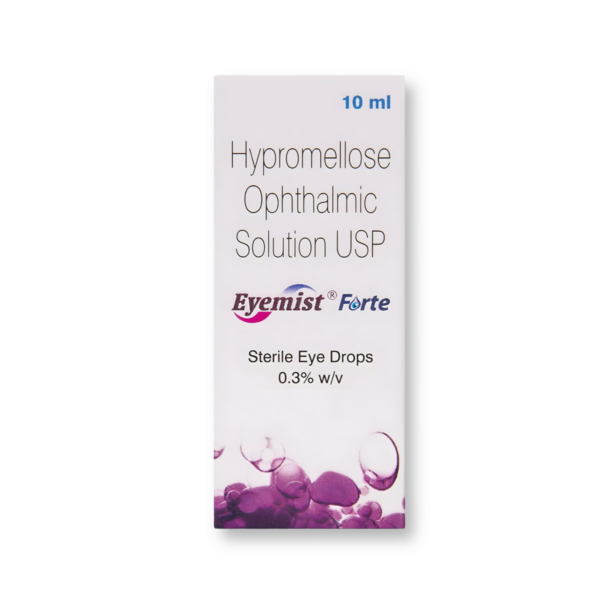
Eyemist Forte 10 ml
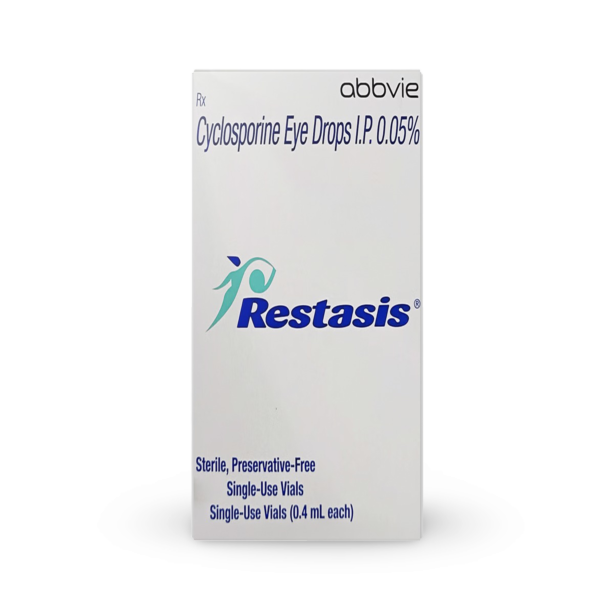
Restasis 0.05% Ophthalmic Emulsion 0.4ml
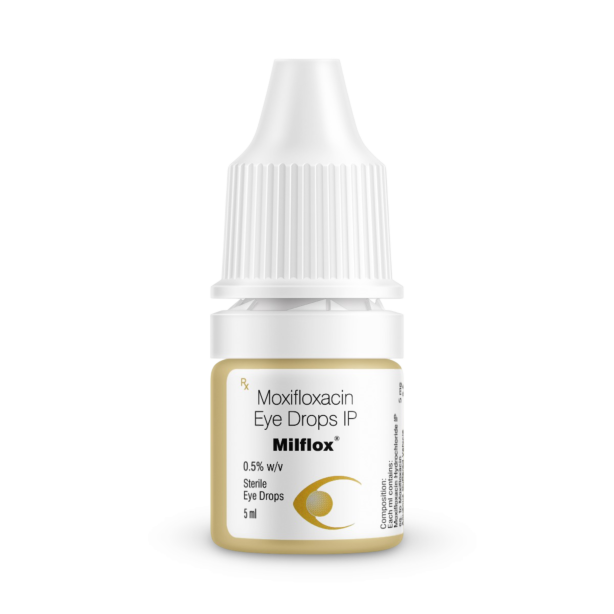
Milflox 0.5% 5 ml
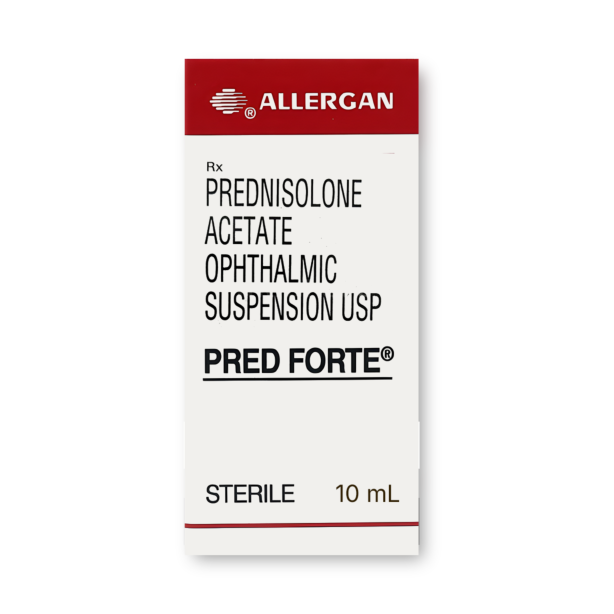
Pred Forte 10 ml
Symptoms to watch
When dealing with swollen eyes, you might notice several signs. Some common symptoms include:
- Puffiness around the eyelids
- Redness in the eyelid or the white of your eye
- Itching or irritation
- Watery eyes
- Pain or tenderness
- Difficulty opening the eye
- Discharge or crusting
- The swollen inner corner of the eye or the swollen lower lid
- Puffiness or waking up with swollen eyes
Noting symptoms of swollen eyes, such as watery eyes, can help identify the cause. Swelling can be mild or severe, potentially affecting your vision or comfort.
Common causes and types of eye swelling
Swollen eyes can happen for many reasons. Some are mild, while others need medical care:
- Pollen, dust mites, pet dander, makeup, or chemicals trigger allergies, which cause swelling, redness, and itching.
- Infections such as Conjunctivitis (Pink Eye), styes, Chalazion (blocked oil gland), Blepharitis (eyelid inflammation), Herpes Simplex or Zoster, and Cellulitis, which cause swelling, redness, discharge, and sometimes pain or fever.
- Injury or trauma to the eye area, leading to swelling, bruising, and redness.
- Crying, which increases fluid buildup and causes temporary puffiness.
- Systemic allergic reactions (Angioedema) cause swelling in both eyelids and possibly other symptoms like rash or wheezing.
- There are underlying health conditions, such as sinus infections, thyroid disease, heart failure, or kidney disease, that cause facial and eyelid swelling.
Talk to a doctor if swelling is frequent, painful, or affects vision.
Risk factors for swollen eyes
Certain factors may increase your chances of developing a swollen eye:
- Allergic reactions to pollen, food, or medications
- Excessive crying, exceptionally prolonged episodes
- Eye injuries from sports or accidents
- Skin conditions such as Eczema or Dermatitis
- Contact lens use without proper hygiene
Home remedies and self-care
If you experience a swollen eye, several home remedies and self-care methods should be considered.
Home remedies
Try simple steps at home to help reduce swelling and soothe your eyes.
- Cold compress: Put a cold, damp cloth on your eye for 10–15 minutes to reduce swelling and soothe discomfort.
- Tea bags: Place cool, used tea bags over your eyes. The tannins in tea may help tighten skin and reduce puffiness.
- Cucumbers: Fresh cucumber slices can refresh tired, puffy eyes and provide a cooling effect.
- Hydrate: Drink plenty of water to flush out extra salt that may lead to swelling.
- Avoid rubbing: Rubbing your eyes can worsen irritation and increase swelling.
- Warm compress (optional): A warm compress may help unclog it and ease swelling if you have a stye or blocked gland.
Hygiene tips
Maintaining good hygiene is essential:
- Keep your hands clean and avoid touching your eyes, especially if exposed to allergens or dirt.
- If you wear makeup or have sensitive eyes, use a mild cleanser or diluted baby shampoo to clean your eyelids and lashes gently.
- Always take off eye makeup at night to prevent irritation or clogged glands.
Avoid irritants
Take steps to reduce exposure to substances that can trigger allergic reactions:
- Minimize exposure to known allergens.
- If you are prone to swollen eyes from allergies, consider an air purifier in your home.
- Use eye drops for swollen eyes only if recommended by a healthcare professional.
When to see a doctor for a swollen eye
While many swollen eyes get better with home care, some signs mean it’s time to seek medical help. Contact a doctor if you have:
- Eye symptoms that don’t improve or get worse after a few days
- Severe eye pain or swelling that closes your eye
- Vision problems like blurriness or double vision
- A fever or feeling generally unwell
- A red, swollen eyelid that spreads or feels hot
- Discharge, crusting, or signs of infection
A healthcare professional can diagnose the cause and recommend the right treatment for swollen eyes.
Treatment for swollen eyes
The right treatment depends on the cause of your swollen eye. A healthcare provider can recommend safe and effective medication for swollen eyes:
- Antibiotic eye drops or ointments: Prescribed for bacterial infections like Conjunctivitis or infected eyelid swelling to eliminate infection and reduce swelling.
- Corticosteroid eye drops: These are used to reduce inflammation in persistent or severe cases under strict medical supervision.
- Antihistamines: Used to relieve swelling and itching caused by allergic reactions. These can be oral or in the form of eye drops, specifically for eye allergies.
- Anti-inflammatory medications: A doctor may prescribe these for eyelid inflammation to reduce swelling and discomfort.
- Topical creams: Some medicated creams can soothe and hydrate the skin around swollen eyes but should only be used after consulting a doctor.
Doctors may perform procedures such as draining fluid from a swollen stye or prescribe oral medications to control eye infection or inflammation for stubborn or severe cases.
Conclusion
A swollen eye can look alarming, but many causes are harmless and temporary. It may involve puffiness in the eyelids, under-eye area, or even the white of the eye. Common symptoms include redness, irritation, pain, or discharge.
Allergies, infections, injuries, and blocked glands are leading causes, while risk factors include eye trauma, skin conditions, or poor contact lens hygiene. Swelling may vary from mild puffiness to serious infections like Orbital Cellulitis. Understanding the type of swelling helps guide treatment.
While home remedies like cold compresses and good hygiene can ease minor swelling, medical treatment is essential for infections or persistent symptoms. Treatments may include antihistamines, antibiotic or steroid drops, and anti-inflammatory medications.
Always seek medical help if swelling worsens, spreads, or affects vision. Knowing when to act can protect your eyes and help them heal faster.

Frequently Asked Questions
How long does Pink Eye last?
Pink eye usually lasts about one to two weeks. If you have it, your eye might feel itchy, red, or watery during this time. It usually gets better on its own, but if it lasts longer or gets worse, you should see a doctor to help you feel better.
What is the most common cause of a swollen eye, like Blepharitis or infection?
The most common cause of a swollen eye due to Blepharitis or infection is an overgrowth of bacteria, particularly Staphylococci, on the eyelids, combined with inflammation and dysfunction of the oil glands (meibomian glands). This bacterial overpopulation leads to irritation, redness, and swelling of the eyelid margins.
What causes fluid under the eyes?
Fluid under the eyes happens when tiny blood vessels leak fluid into the skin. This can happen because you didn’t sleep well, ate too much salty food, or are tired. Sometimes, allergies or crying can also cause swelling under your eyes. It is common and usually not serious.
How can I tell if my swollen eye nerve is caused by inflammation or infection?
By checking for pain, redness, and warmth, you can tell if your swollen eye nerve is caused by inflammation or infection. Infection often brings fever and pus, while inflammation may cause swelling without these signs. If you feel uncomfortable or see vision changes, see a doctor quickly.
When referencing outside resources, GoodrxMedicine always provides full citations. To learn more about the measures we use to maintain the quality of our content, please review our Content Information Policy.



